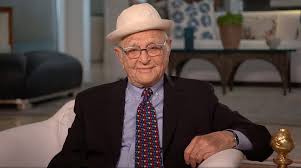Hovering over Norman Lear’s life was one indomitable force.
That was his father. “I loved him, but I didn’t always like him,” Lear (shown here), who died Tuesday at 101, once told reporters.
Hyman “Herman” Lear “was going to make and have a million dollars in 10 days to two weeks, all his life,” Lear told the Television Critics Association in 2016. “And, of course, he didn’t come close.”
And then his son surpassed any such dreams. He became “a television hero,” Michael Kantor said in 2016, the year he produced an “American Masters” profile of Lear that many PBS stations will rerun at 9 p.m. Friday, Dec. 8. Lear’s success could be measured in:
— Nielsen ratings. The list for 1974-75 had Lear’s shows filling half the top 10. “All in the Family” and “Sanford and Sons” were first and second, with “Jeffersons” at No. 4, “Good Times” at No. 7 and “Maude” at No. 9.
— Or changes in a once-stagnant comedy world. In three of those five shows, the central characters were Black; in the others, they were a strong feminist and her exact opposite, a bigot.
That was Archie Bunker, who seemed familiar to Lear. His own dad, he said, had grand promises. He “believed it and he leaned into life that way. He lied; he cheated. (But) I loved that lust for life.”
Lear was 9 when his dad went to prison for selling phony stocks, 12 when his dad got out … and promptly promised the boy a year-long vacation for his bar mitzvah.
Instead, Norman often supported himself, holding three jobs on Coney Island. He left college for World War II and became a press agent in New York, then joined a family friend for a comedy-writing duo.
“I was doing live television,” Lear recalled. The duo was “there from Day One of the Martin-and-Lewis ‘Colgate Comedy Hour.’ We did Jack Haley … a Bobby Darin special, Danny Kaye special, Jack Benny special … We did an Andy Williams variety show. Everything we were doing was live.”
But those shows were all one-and-done; the pay was much better for ones that could rerun. “I said, ‘I gotta do a situation comedy.’”
That’s when he heard about “Till Death Us Do Part,” a British sitcom. As he wrote in “Even This I get to Experience” (Penguin Press, 2014), the show had “a bigoted father and his liberal son, who fought about everything under the son. I thought instantly: ‘My dad and me.’”
But in the British version, Lear told the TCA, the parents were just nasty. “I wouldn’t wish to work with totally unlikable characters.” He cast Carroll O’Conner and Jean Stapleton, who brought warmth.
ABC saw the pilot film, hesitated, asked it to be shot again with the younger characters recast. It was – this time with Rob Reiner and Sally Struthers – and there was another pause.
After two years, ABC said no. That’s when Lear’s colleague, pitching a different project to CBS program chief Mike Dann, also showed the Bunker pilot. The result, Lear wrote, was quick:
“Mike Dann started laughing from the first lines, and loudly. Fred Silverman, a VP of programmig, … came in. When it was over, (they said,) ‘Don’t let this tape leave the building.”
“All in the Family” launched the comedy golden age, with shows by Lear and by MTM (“Mary Tyler Moore,” “Rhoda,” etc.) filling CBS. It also launched a new era when TV tackled controversial subjects.
Some of Lear’s shows (“Diff’rent Strokes,” for instance) were mild, some were controversial, all were funny. When Rachel Grady crafted that PBS documentary, she found the quantity overwhelming.
“I think he did over 1,000 hours in the ‘70s,” she said., “It’s an embarrasment of riches.”
He had six shows on the air when he put someone else in charge and began focusing on his family and on social issues. He created People For the American Way and even bought and toured with one of the original copies of the Declaration of Independence.
Still, Lear did return to comedy as he neared 100. He was one of the producers of a Latina reboot of “One Day at a Time” on Netflix and of Jimmy Kimmel’s live productions using original scripts. The wit of Lear shows kept drawing new laughter.

Lear’s great life had Bunker-ish roots
Hovering over Norman Lear’s life was one indomitable force.
That was his father. “I loved him, but I didn’t always like him,” Lear (shown here), who died Tuesday at 101, once told reporters.
Hyman “Herman” Lear “was going to make and have a million dollars in 10 days to two weeks, all his life,” Lear told the Television Critics Association in 2016. “And, of course, he didn’t come close.”
And then his son surpassed any such dreams. He became “a television hero,” said Michael Kanto, said in 2016, the year he produced an “American Masters” profile of Lear that many PBS stations will rerun at 9 p.m. Friday, Dec. 8. Lear’swho produced a PBS profile of Lear that year. Lear’s success could be measured in: Read more…